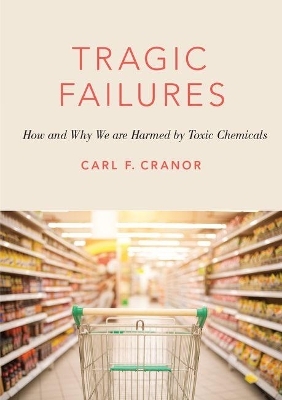
Tragic Failures
How and Why We are Harmed by Toxic Chemicals
Seiten
2017
Oxford University Press Inc (Verlag)
978-0-19-063575-6 (ISBN)
Oxford University Press Inc (Verlag)
978-0-19-063575-6 (ISBN)
A world awash in little understood chemicals tragically harms adults and children alike. Laws keep health agencies in the dark about toxicants, slow, well motivated research hampers protections, and strenuous vested opposition exacerbates the harm. How science is used in the tort law can facilitate or frustrate redress of harm. This book recommends better approaches.
The world is awash in chemicals created by fellow citizens, but we know little to nothing about them. Understanding whether even the most prevalent ones are toxic would take decades. Many people have tragically suffered serious diseases and premature death, including children during development. Why has this occurred?
Many factors contribute, but two important ones are the laws permitting this and the manner in which science has been used to identify and assess whether or not products are toxic. Both are the outcome of legislative, corporate, and judicial choices.
Congress created laws that in fact keep public health officials and the wider population in the dark about the toxicity of virtually all substances other than prescription drugs and pesticides. Facing considerable ignorance about toxic substances, impartially motivated scientists seeking to protect the public health are constrained by the natural pace of studies to reveal toxic effects. Corporate pressures on public health officials and scientific obstruction substantially heighten the barriers to protecting the public.
When people have suffered serious as well as life-threatening diseases likely traceable to toxic substances, judicial errors barring relevant science in the personal injury (tort) law can and have frustrated redress of injustices.
Under both public health law and the tort law, there are possibilities for improved approaches, provided public leaders make different and better choices. This book describes these issues and suggests how we could be better protected from myriad toxic substances in our midst.
The world is awash in chemicals created by fellow citizens, but we know little to nothing about them. Understanding whether even the most prevalent ones are toxic would take decades. Many people have tragically suffered serious diseases and premature death, including children during development. Why has this occurred?
Many factors contribute, but two important ones are the laws permitting this and the manner in which science has been used to identify and assess whether or not products are toxic. Both are the outcome of legislative, corporate, and judicial choices.
Congress created laws that in fact keep public health officials and the wider population in the dark about the toxicity of virtually all substances other than prescription drugs and pesticides. Facing considerable ignorance about toxic substances, impartially motivated scientists seeking to protect the public health are constrained by the natural pace of studies to reveal toxic effects. Corporate pressures on public health officials and scientific obstruction substantially heighten the barriers to protecting the public.
When people have suffered serious as well as life-threatening diseases likely traceable to toxic substances, judicial errors barring relevant science in the personal injury (tort) law can and have frustrated redress of injustices.
Under both public health law and the tort law, there are possibilities for improved approaches, provided public leaders make different and better choices. This book describes these issues and suggests how we could be better protected from myriad toxic substances in our midst.
Distinguished Professor of Philosophy, and Faculty member of the Environmental Toxicology Graduate Group, University of California Riverside. Author of Regulating Toxic Substances (OUP 1993), Legally Poisoned: How the Law Puts Us at Risk from Toxicants (Harvard 2013), Toxic Torts: Science, Law and the Possibility of Justice (CUP 2006)
Preface
Introduction
Chapter 1: Industrial Chemicals as Nuisances: The Rise of Environmental Health Laws and Their Limitations
Chapter 2: Cancers, Brain Disorders, and the Feminization of Boys: Can We Avoid Poisoning Our Children? . .
Chapter 3: How Do Obscure Supreme Court Decisions Affect Me?
Chapter 4: How Demands for Ideal Science Undermine the Public's Health
Chapter 5: Conclusion
| Erscheinungsdatum | 20.03.2017 |
|---|---|
| Reihe/Serie | The Romanell Lectures |
| Verlagsort | New York |
| Sprache | englisch |
| Maße | 180 x 130 mm |
| Gewicht | 295 g |
| Themenwelt | Geisteswissenschaften ► Philosophie ► Ethik |
| Studium ► Querschnittsbereiche ► Prävention / Gesundheitsförderung | |
| Sozialwissenschaften ► Soziologie | |
| ISBN-10 | 0-19-063575-4 / 0190635754 |
| ISBN-13 | 978-0-19-063575-6 / 9780190635756 |
| Zustand | Neuware |
| Haben Sie eine Frage zum Produkt? |
Mehr entdecken
aus dem Bereich
aus dem Bereich
das Manual zur psychologischen Gesundheitsförderung
Buch | Hardcover (2023)
Springer Berlin (Verlag)
CHF 55,95
Wissenschaftlich basierte Empfehlungen, Tipps und Ernährungspläne für …
Buch (2022)
Thieme (Verlag)
CHF 69,95
Orthomolekulare Medizin in Prävention, Diagnostik und Therapie
Buch | Hardcover (2022)
Thieme (Verlag)
CHF 81,80


